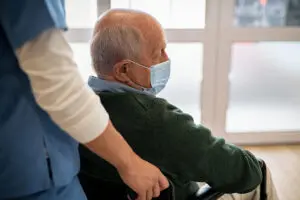A Reading nursing home abuse lawyer provides essential legal support for victims of mistreatment in long-term care facilities. These attorneys specialize in protecting the rights of elderly and vulnerable residents who have suffered neglect, physical abuse, or emotional trauma. When families place their trust in nursing homes, they expect professional care and respect for their loved ones. However, when that trust is broken, the consequences can be severe. By choosing to work with a Reading nursing home abuse lawyer, families take a stand not just for their loved ones, but for the safety and well-being of all nursing home residents in our community.
If you suspect your loved one is the victim of nursing home abuse in Reading, PA, don’t wait. Contact a nursing home abuse attorney at Muney Law today for a free consultation.
$32 Million Wrongful Death
$26 Million Truck Accident
$20 Million Commercial Vehicle Accident
$17.5 Million Car Accident
$12 Million Work Injury
$11 Million Truck Accident
$9 Million Truck Accident
$8 Million Truck Accident
$8 Million Truck Accident
$7.5 Million Auto Accident
$6.9 Million Garbage Truck Accident
$6.5 Million Traumatic Brain Injury
The Rights of Nursing Home Residents in Reading, PA
 When someone enters a nursing home, they often find themselves in a very vulnerable state. It is important to know that your loved one has rights under the law that their caregivers at the nursing home must uphold and protect.
When someone enters a nursing home, they often find themselves in a very vulnerable state. It is important to know that your loved one has rights under the law that their caregivers at the nursing home must uphold and protect.
Residents of nursing homes and elder care facilities have certain rights outlined by the Pennsylvania Department of Aging. These rights include:
- The right to be informed about their medical conditions and treatment and to participate in their own plan of care. Residents must be given the opportunity to participate in developing their care plan, and have the right to refuse care.
- The right to choose one’s own doctor and pharmacy.
- The right to be informed in writing about the facility’s policies and about any charges incurred for services rendered.
- The right to privacy, including the confidentiality of medical information
- The right to manage one’s own personal finances. In the event that the nursing home has been placed in charge of the resident’s finances, the resident has the right to remain informed and to receive regular updates about their financial situation.
- The right to be treated with dignity and respect
- The right to be free from mental, physical, sexual abuse, exploitation, neglect, and involuntary seclusion
- The right to make an official complaint without retaliation.
- The right to communicate confidentially with others
Nursing home residents also have the right to sue if they suffer from abuse or neglect at their facility. If your loved one is not capable of pursuing legal action on their own behalf, they may designate someone to do so for them (often called “power of attorney”).
Knowing the Signs of Nursing Home Abuse in Reading
There are many different kinds of elder abuse that take place at nursing homes. Nursing home residents can be subjected to physical abuse, sexual abuse, emotional and psychological abuse, and financial abuse. Abuse can take the form of overt acts of violence, as well as failure to provide adequate care and attention.
Signs of abuse and neglect in nursing homes include:
- Unexplained bruises, cuts, burns, sprains, or broken bones in various stages of healing
- Bedsores
- Falls
- Unexplained venereal disease or infections
- Sudden changes in behavior or mood
- Rapid weight loss
- Staff refusing to allow visitors to see resident or delays in allowing visitors to see resident
- Staff not allowing the resident to be alone with the visitor
- The resident being kept in an over-medicated state
- Loss of resident’s possessions
- Poor hygiene
- Sudden large withdrawals from bank accounts or changes in banking practices
- Abrupt changes in a will or other financial documents
- Deliberate lack of communication between caregivers and patient’s family members
- Nursing home staff being uncooperative or evasive
In the most tragic cases, neglect or abuse can be fatal. If you believe that negligence at a nursing home caused your loved one’s death, you may be able to file a wrongful death lawsuit against the facility and/or the individuals responsible for their care.
Contact a nursing home abuse lawyer about your concerns. There is no charge and no risk in meeting with a nursing home abuse lawyer, and the consultation may provide you with the information and the peace of mind you need to move forward. During our initial meeting, we will answer your questions, give you advice based on the information we have gathered, and explain your options. If you choose to move forward, we will get to work right away.
What to Do If You Suspect Nursing Home Neglect in Reading
 If you suspect that your family member is suffering from abuse, neglect, or improper care at a Reading nursing home, you have the right to take action. These are the steps you can take to protect your loved one and begin the legal process.
If you suspect that your family member is suffering from abuse, neglect, or improper care at a Reading nursing home, you have the right to take action. These are the steps you can take to protect your loved one and begin the legal process.
- Document the Signs: Keep a detailed record of the observed signs, including dates, times, descriptions, and any relevant photographs or videos if possible.
- Report the Concerns: Inform the nursing home administration and file a formal complaint. Ensure that your concerns are addressed promptly.
- Seek Medical Attention: If your loved one has suffered physical injuries or shows signs of neglect, seek immediate medical attention to address their health needs.
- Contact Authorities: If you suspect immediate danger or life-threatening situations, contact local law enforcement or adult protective services to report the abuse.
- Consult with a Reading Nursing Home Abuse Lawyer: Seek legal advice from an experienced nursing home abuse lawyer who can guide you through the legal process, protect your loved one’s rights, and help you seek justice.
- Remember, your loved one has the right to live in a safe and nurturing environment. By recognizing the signs of nursing home abuse and taking swift action, we can protect our vulnerable seniors and ensure that they receive the care and respect they deserve.
Why Consulting a Reading Nursing Home Neglect Lawyer is Your Best Option
Nursing home abuse is a grave concern that affects our vulnerable elderly loved ones who reside in long-term care facilities. If you suspect that your loved one has been subjected to abuse or neglect, it is crucial to seek legal assistance from a skilled and compassionate nursing home abuse lawyer. These professionals specialize in advocating for the rights of victims and their families, holding negligent parties accountable, and ensuring justice is served.
Here are some benefits of hiring a nursing home abuse lawyer:
Legal Expertise: Nursing home abuse cases can be complex, involving various legal aspects such as negligence, medical malpractice, and breach of duty. A lawyer with expertise in nursing home abuse cases has a deep understanding of the laws and regulations surrounding elder abuse, allowing them to navigate the legal process effectively.
Investigation and Gathering Evidence: A nursing home abuse lawyer will conduct a thorough investigation into the circumstances of the case. They will gather crucial evidence such as medical records, facility documentation, surveillance footage, and witness testimonies to build a strong case on your behalf. This meticulous investigation is essential for proving liability and holding the responsible parties accountable.
Identifying Liable Parties: Determining liability in nursing home abuse cases can be challenging. A skilled lawyer will carefully assess the facts and circumstances surrounding the abuse to identify all potentially liable parties, including the nursing home facility, staff members, administrators, or even third-party contractors. Holding all responsible parties accountable can increase the chances of obtaining fair compensation for the victim.
Negotiating with Insurance Companies: Insurance companies representing nursing home facilities may try to minimize the compensation owed to victims and their families. A nursing home abuse lawyer will have experience negotiating with these insurance companies to ensure you receive the maximum compensation you deserve. They will fight for your rights and protect your interests throughout the legal process.
Pursuing Compensation: Nursing home abuse can result in physical, emotional, and financial damages. A skilled lawyer will help you pursue compensation for medical expenses, pain and suffering, emotional distress, rehabilitation costs, and any other losses incurred due to the abuse. They will work diligently to calculate the full extent of your damages and seek fair and just compensation on your behalf.
Remember, time is of the essence in nursing home abuse cases, as evidence may be lost or memories may fade. If you suspect nursing home abuse, contact a nursing home abuse lawyer as soon as possible to protect your loved one’s rights and seek justice. Your Reading injury lawyer will guide you through the legal process, provide the necessary support, and fight for the compensation and justice your loved one deserves.
Reading Nursing Home Abuse FAQs
How do I report nursing home abuse or neglect in Reading, Pennsylvania?
The first step in reporting nursing home abuse and holding the facility legally accountable is to make an official complaint with the Pennsylvania Department of Aging.
What is an ombudsman?
The Pennsylvania State Long-Term Care Ombudsman Program under the Pennsylvania Department of Aging contracts with 52 Area Agencies on Aging to provide Ombudsman services throughout the Commonwealth. An ombudsman is a trained individual who helps protect the rights of Pennsylvanians living in long-term care facilities. The ombudsman investigates claims of abuse and neglect and works closely with families as well as local law enforcement and other community entities.
Is nursing home abuse the same as medical malpractice?
Nursing home neglect and medical negligence are different types of legal cases. Medical malpractice can take place at a nursing home. For example, if the medical personnel at the facility committed negligence in giving your loved one the wrong medication or wrong dosage, misdiagnosed their condition, or failed to provide adequate medical treatment, that may be considered malpractice. A Reading nursing home abuse lawyer at Munley Law will review your situation in detail to identify all defendants and determine the best course of action. Contact us today to schedule a free consultation.









